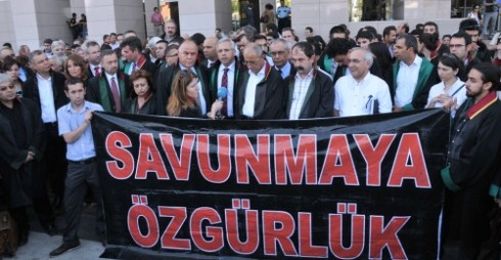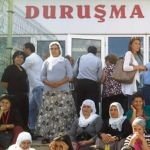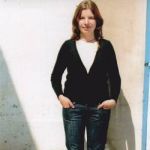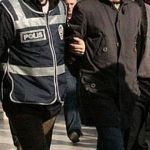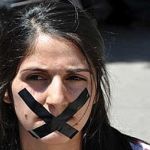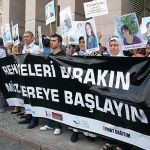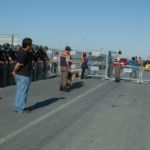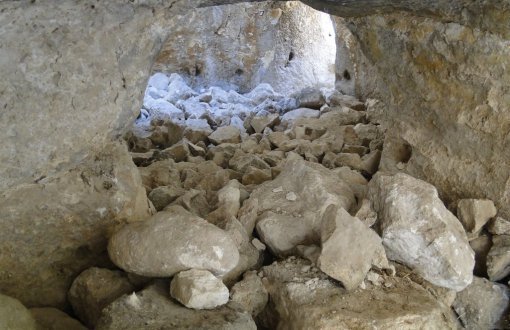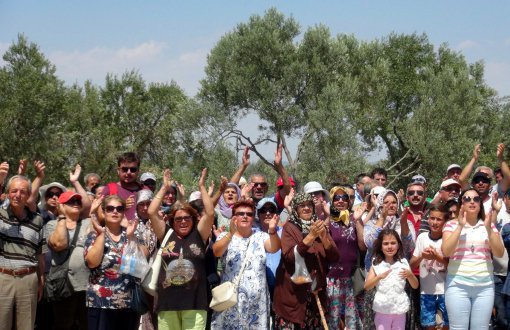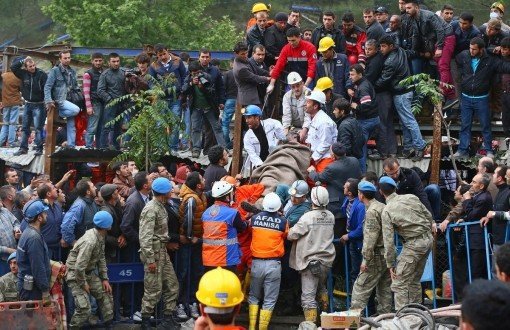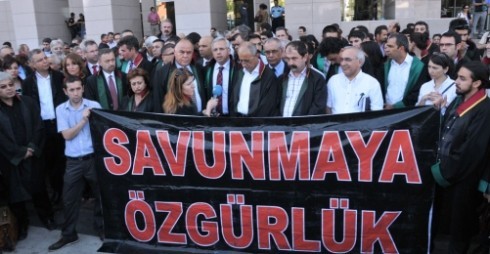
The defendant lawyers in the second Kurdistan Communities Union (KCK) trial in Istanbul requested a stay of proceedings and the suspects' release during Monday's hearing, on the grounds they had been arrested in connection with their professional activities and in conflict with due processes. The court rejected their demands in the suit where some 50 suspects, 46 of them lawyers, are standing trial on terrorism related charges.
The court also rejected the defendants' demands to plea in their native Kurdish and for Abdullah Öcalan, the jailed leader of the Kurdistan Workers' Party (PKK,) to be heard in the trial as well.
The hearing commenced at 12:00 p.m. in Istanbul's Çağlayan courthouse.
Chief Judge Mehmet Ekinci and judges Bülent Kınay and Seyfettin Mermerci presided over the trial, while prosecutor Ufuk Ermertcan also attended the hearing. Some 37 suspects are currently under arrest pending trial in connection with the suit. One is a journalist, while the remaining 36 are lawyers.
Over 100 lawyers participated in the trial to represent the defendants, including the heads of the Bar Associations of Ankara and the southeastern provinces of Diyarbakır, Mardin, Van, Tunceli and Şırnak, as well as Vedat Ahser Coşar, the head of the Union of Turkish Bar Associations. The head of the Istanbul Bar Association and representatives from Amnesty International also attended the hearing as observers.
One other lawyer also represented the suspects on behalf of his colleagues who arrived from Great Britain, Germany, Sweden and France in a show of support for the defendants. Dismayed by the presence of lawyers from abroad, however, Chief Justice Ekinci asked him in response: "Our lawyers are through, and now it is your turn?"
Short on space, big on prisoners
Lack of space proved to be a significant hurdle, as the trial kicked off in the First Court for Serious Crimes rather than in the 16th Court for Serious Crimes to allow for more room. Even then, however, the lawyers still had difficulty trying to enter the courtroom, leading to a quarrel between them and the Chief Justice in the ensuing commotion.
"Why [are you] not holding the trial in a bigger hall? If [you are] not holding [the trial in a bigger hall,] then why do you arrest so many people?" one of the lawyers said.
"This is our biggest hall. There is nothing to do," Chief Justice Ekinci responded.
When lawyers from the French Bar Association attempted to take a photograph with a cell phone, Chief Justice Ekinci also told them it was forbidden.
"All meetings with Öcalan took place under the permission and supervision of the state"
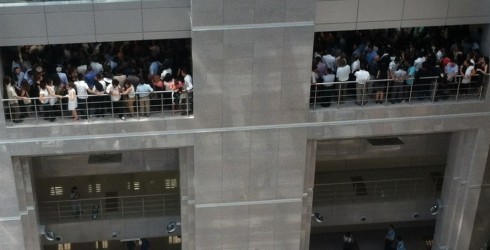
When court officials began taking attendance, the suspects responded in their native Kurdish: "Ez li virim." ("I am here.")
"This is a historic and showcase trial where the [practice of] law has been torn down into pieces. It ought to be introduced to law students in the future as course [material. This case] has gone down in world history as the incident where the largest number of lawyers has been taken under custody at a single time. That a country which says it will bring democracy to Syria is doing this [only] leads to a bitter smile. Professional privacy has been trampled upon when [officials] raided [the suspects'] law offices on Nov. 22, 2011. Their professional and private lives and their right to defend their clients have been suspended," said Doğan Erbaş, one of the arrested lawyers, while speaking in court on behalf of all the suspects.
"It is the Kurds' and socialists' efforts to foment [a political] will and to express themselves that constitute the subject of this trial. This is a historic trial. We are going to create a history together. Your court will either serve as a means toward a solution or it will play the 'three monkeys' by condemning our client Abdullah Öcalan and the Kurdish people to a chauvinistic nationalism. Whether [this court] ties a knot in the Kurdish problem or removes an obstacle remains to be seen," he said.
"The entire indictment consists of our meetings with Abdullah Öcalan. All meetings with lawyers took place under the permission and supervision of the state from the first day to the last. Everything had been pre-determined through the laws; there was no place for coincidence or initiative in the meetings. Under these circumstances, it would be impossible to administer the Leadership Committee mentioned in the indictment. To associate these meetings with secret directives for the organization and [its] actions is tantamount to a freak of law. If the Leadership Committee exists, then our client Öcalan should be heard before anything else. Öcalan is the only witness and client. If our client's views are on trial, then he personally ought to say it himself. Is İmralı Island and island of peace or a base of war? This trial will not be fair unless this comes to light. It is not the state that is on the receiving end of injustice, it is us and our client who has been held in isolation throughout the past year who are sitting on the receiving end of injustice," Erbaş said.
Following a recess after Erbaş's speech, the lawyers once more stepped into the courtroom amidst a storm of applause and slogans calling for the defendants' release.
"A blow to the politics of negotiation"
"Throughout our detention, [officials] kept asking us whether we were aware of the talks with the state on İmralı Island. This operation is a blow upon the politics of negotiation. It is the method of holding negotiations to resolve the Kurdish problem that lay on the bull's eye during the operations against us and the MİT (National Intelligence Organization) on Feb. 7. The start of the investigation on March 2010 also coincides with a period when the government became more actively engaged in the talks. The operation was intended to ensure that no one would again dare to make such an attempt," Erbaş said.
"Our client Öcalan contributed to the [PKK's] decision for inaction within the knowledge of the state. The negotiations were about to yield results. This operation was intended against the search for peace that the prime minister has recently let go of. We reject [the charges of being] managers and members of the Leadership Committee," he added.
"Right to Plea in One's Native Tongue"
Lawyer Erbaş also requested that the court stay the proceedings and recognize the defendants' right to plea in their native Kurdish.
"The president, the prime minister and many other judicial authorities have expressed that Kurds constitute a primary, founding constituent [of this country.] The Kurds' [right] to speak in their mother tongue in public spaces ought not be limited to the [terms of the] Treaty of Lausanne," Erbaş said.
Mehmet Emin Aktar, the head of the Diyarbakır Bar Association, also requested a stay of proceedings on the grounds that the Attorneys' Act mandated the issuing of a permit from the Justice Ministry to try the suspect lawyers, a requirement that officials had failed to fulfill.
Aktar then also requested the defendants' release and the revocation of their arrest orders.
Following a 45 minute long recess, however, the court rejected all the defendants' demands.
Chief Justice Ekinci also denied the defendants' request to plea in their native tongue by citing article 202 of the Code of Criminal Procedure (CMK.)
"If the suspect or the victim does not speak Turkish well enough to express themselves, then a translator appointed by the court translates the essential points in the allegations and the defense in the hearing," reads the CMK's 202nd article. (NV/HK)





